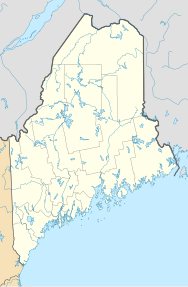Canton, Maine
| Canton, Maine | |
|---|---|
| Town | |

Main Street in 1909
|
|
| Location within the state of Maine | |
| Coordinates: 44°27′26″N 70°18′15″W / 44.45722°N 70.30417°W | |
| Country | United States |
| State | Maine |
| County | Oxford |
| Incorporated | 1821 |
| Area | |
| • Total | 30.50 sq mi (78.99 km2) |
| • Land | 29.12 sq mi (75.42 km2) |
| • Water | 1.38 sq mi (3.57 km2) |
| Elevation | 400 ft (122 m) |
| Population (2010) | |
| • Total | 990 |
| • Estimate (2012) | 981 |
| • Density | 34.0/sq mi (13.1/km2) |
| Time zone | Eastern (EST) (UTC-5) |
| • Summer (DST) | EDT (UTC-4) |
| ZIP code | 04221 |
| Area code(s) | 207 |
| FIPS code | 23-10005 |
| GNIS feature ID | 0582386 |
| Website | www.cantonmaine.org |
Canton is a town in Oxford County, Maine, United States. The population was 990 at the 2010 census. Located beside Lake Anasagunticook, Canton is a summer recreational area.
Canton Point was the site of Rockemeka, village of the Anasagunticook (or Androscoggin) Abenaki Indians. It is said the tribe had 500 acres (2.0 km2) cleared to raise corn. By 1757 the tribe population was devastated by smallpox.
The land became part of a grant the Massachusetts General Court awarded to Captain Joseph Phipps and 63 other soldiers for their services during the French and Indian War. Called Phipps-Canada, it would be incorporated in 1795 as Jay in honor of John Jay, the first chief justice of the U. S. Supreme Court. On February 5, 1821, Canton was set off from Jay and incorporated, named after Canton, Massachusetts.
Settlement began in the early 1790s when William Livermore, William French, Joseph Coolidge and Alexander Shepherd arrived. Others followed, principally from Massachusetts. The surface of the town is uneven in the outskirts, but smooth and level at Canton Point, where the soil was considered unsurpassed in the state for agriculture. The outlet of Lake Anasagunticook provided water power for industry. Gustavus Hayford settled here in 1814. In addition to a log cabin, he built a sawmill and gristmill. First called Hayford Mills, it would be renamed Canton Mills, and now Canton. In the 19th century, it had a machine shop to manufacture farm implements, a tinware factory and an iron foundry. It remains the business center. The Rumford Branch of the Maine Central Railroad passed through the town in the late 1850s, carrying freight but also tourists. The community developed as a resort area for camping.
...
Wikipedia

